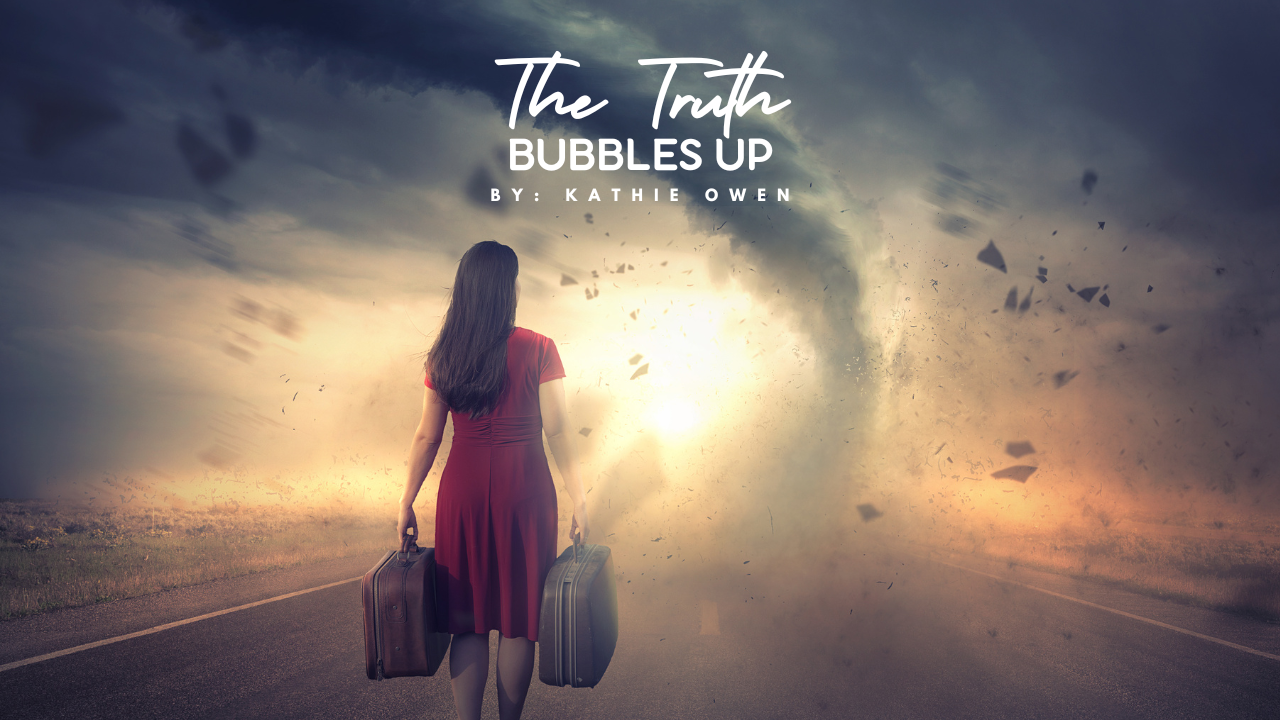Expectations for Success Seekers
Article Summary
Today we discuss expectations. Expectations are a funny thing and they require balance because if you expect too much you set yourself up for failure. Expect too little and you will not exert yourself to acheive your goals.
Kathie gives an exercpt from her book The Truth Bubbles Up on expectations. She also gives entrepreneurs, coaches, and team members 5 research based tips on setting expectations that actually convert into growth.
If you know someone who can benefit from this article feel free to share it with them using the simple share buttons to the side. Thank you!
Working With the Law by Raymond Holliwell
If you are working for success, health, or happiness, you may wish for a lot, but you will only enjoy as much as you are able to expect.
Excerpt from Kathie’s book The Truth Bubbles Up
I sat there that summer day complaining about Kendall endlessly. I am quite sure Shary (my therapist) was tired of hearing me complain. And I am sure she told me this statement over a hundred times. But today this rang true, “And you expected something different from that man?!”
It was at that moment that I realized two things. First, my expectations were setting me up for failure. And second, Kendall’s behaviors were actually giving me power.
Remember narcissists see the cause of their problems as external due to their defenses of denial, distortion, and projection, their ability to look at themselves introspectively is limited. Every single thing Kendall was denying, distorting, and projecting onto me was taking place inside of him. “How could I expect anything different from that man?” I say with a victorious Texas accent smile in my heart.
Now I must mention here that I have a degree in Psychology. Human behavior and the mind have always been something that intrigues me. My dad, having a Ph.D. in Math, questioned my changing my major to psychology. Of course, he did. But today, he knows that was worth his money. I use that degree every single day of my life!
I did a paper on the book Psycho-cybernetics while in college. That book definitely stuck in my subconscious. And I did not pick it back up to study it again until 2022, almost 40 years later.
Shary loved to read and research human behavior too. She taught A Course in Miracles. A Course in Miracles is often abbreviated ACIM or simply called the Course. It is a complete self-study spiritual thought system. Shary often taught me principles from this book and I did not actually practice the entire course until 2018.
I had always been an avid reader, especially when I encountered problems in my life. You could definitely say Psycho-cybernetics started that journey. I read parenting books when the boys were little, mostly because I was left to parent on my own. But once I met Shary I opened doors to new books. She introduced me to Depak Chopra, yes I read all of his books. I read Dr. Wayne Dyer’s books, my favorite is Change Your Thoughts Change Your Life. I read authors like Marianne Williamson and Brian Weiss. Dr. Weiss has very interesting books. You can find many life-changing books right here on this page! And yes, I have read every single one of them!
My favorite, most life-changing book for me to this day, was by Eckhart Tolle A New Earth. The book was released in 2005. Oprah Winfrey had this book in her book club and I took her online course on the book. To this day, Eckhart stands as my favorite author and teacher of all time.
What I learned from that book is something that altered the course of my life forever. As I walked I calmed down. I slowly but surely came to realize something that day. Something that would give me my power back. I let go!
Letting go may sound really simple to you. And I get that. But what I learned from Eckhart Tolle is that letting go is something very important for all of us. I had been holding onto what was what I thought had been an expectation for my life. I expected my boys to be with me, I was their mom. I expected Kendall to share custody as I would have done for him had I been given the power that he stole from me.
I also expected my boys to be raised and to be taught to respect their own mother. And treat others with kindness and always be humble. But all of those expectations boiled down to one sentence, “And you expected something different from that man?!”
Expectations are a funny thing. I once heard a Chinese Proverb that said,
Happy is the man who expects nothing for he is never disappointed.
And I did go to that extreme at one point. It felt good there. I was never disappointed, I thought. But I also was not living.
They say the journey and the destination are one. You need expectations to walk that journey to your destination. And so it is with expectations. We expect to win but the effort that’s put into that win makes all the difference.
Effort and Expectations
Your effort must also be smart and reflected in your work rate in practice and games.
“Winning is not something built in a day; it is constructed year-round. As always, it comes down to progressive, consistent effort, with a view toward a long-range goal.”
When it comes to expectations we must put in progressive, consistent effort to exceed those expectations.
Do we need high expectations?
Setting high expectations isn’t enough to guarantee that those expectations are met. After all, many of us set goals for ourselves every year that we fail to achieve.
Expectations are a funny thing. We all have different ways of setting expectations. Maybe we expect success to happen overnight, or new experiences to put us in a good mood.
We need expectations but sometimes it is just the right thing to step back and evaluate those expectations. because they can wreak havoc in our lives if we do not keep them in check.
Some ways we can reduce expectations are: through gratitude, stopping assumptions, reminding ourselves what we can or cannot control, and seeking to empathize and understand others.
Here are five research-based tips to help convert expectations to growth — for entrepreneurs, coaches, and team members of all levels.
1 - Believe it’s possible.
We all have dreams. But success very rarely happens overnight. And failure is going to happen on our journey. Often times we do not want to put in the work or suck it up when failure does happen.
The research on growth and learning mindsets confirms the importance of believing that intelligence and ability are malleable in driving effort and persistence.
As you set goals for yourself and others, use stories of struggle to success as reminders that achieving difficult goals is hard work, often involving many failures along the way. Setting the expectation for the ups and downs of learning can actually help sustain the belief in the possibility of success. I love the book The Obstacle is the Way because it covers this topic in detail!
2 - Have a plan for what to do next.
High expectations are important, but they must be matched with the means to achieve them.
In his book Peak, Anders Ericsson, the expert on gaining expertise, urges those wanting to develop expertise to get a coach to help identify what to work on next. It’s the deliberate focus on incremental challenges that lead to growth and goal attainment (just like in video games and in many of the fitness apps on the market today).
3 - Incorporate a feedback mechanism to motivate and guide course corrections.
Fitbit and other health and fitness devices use progress tracking and feedback to help users stay motivated. It’s easy to surrender to a goal if you don’t see yourself making any progress toward it. It is optimization data at its finest.
Small wins keep us pressing forward, but growth isn’t typically a smooth and steady journey. Some steps forward are easier than others. We need to see periods of stagnation and even regression as natural phases in a long-term growth process, not as evidence of our inability.
Being stuck should be a signal to look for help, to seek alternative paths, or to get reassurance to be patient. It shouldn’t be a signal to quit.
We need to see periods of stagnation and even regression as natural phases in a long-term growth process, not as evidence of our inability.
4 - Be careful not to confuse expectations with measures of the expectation.
There are actual hazards of over-stressing the measures of an expectation over the expectation itself.
The smartwatch goal for the day is a great example of this. If one was to become obsessed over the measure of how many calories they burned they are likely to confuse the expectation of meeting that goal. They will close that ring but did they really achieve the success they wanted?
Ideally, you want multiple measures of progress and success, and you need to keep those tangible measures tethered to the broader goals they support.
Success isn’t a competition to define winners and losers. It’s about constant reflection and recalibration to find the best path to growth.
5 - Be thoughtful about the stakes.
What do we get for achieving our goal? What happens if we fail? Daniel Pink, in his summary of the research on what drives us, tried to put to rest the carrot-and-stick approach that dominated thinking about motivation in the 20th century. Pink and other researchers point, instead, to the power of connecting learning to a larger purpose.
Nonetheless, punitive consequences like being labeled a failing school, a struggling student, or an ineffective teacher are still around, as are monetary rewards for meeting targets.
Accountability matters, but the same consequences for failure or success may not have the same impact on different audiences. If an individual or community doesn’t already value learning, carrots may be a necessary reward to initiate engagement.
On the other hand, in a group that already gives social status for learning growth, external rewards or punishments may undercut intrinsic drives. And tying high-stakes external consequences to measures of goals, like test scores, can lead to unproductive behaviors. Understand your audience and match the stakes accordingly.
The setting, sustaining, and ultimately achieving learning goals should be an iterative process. Learning isn’t a competition to define winners and losers. It’s about constant reflection and recalibration to find the best path to growth. Goals provide a target, but without the beliefs and processes to achieve them, we’re bound to be disappointed.
Conclusion
So in closing, it is safe to say that there are many variables to consider when evaluating expectations. As I said expectations are a funny thing. But if we don’t have some expectations we can become stagnant, never try for that prize, or as the quote says at the very beginning of this article only enjoy as much success as we expect.
We can:
Believe it is possible
Have a plan
Incorporate a feedback guide
Be sure not to confuse expectations with actual goals
Be thoughtful of our stakes. And then we may just find our journey to success is just as much fun as the destination!
Thank you for spending part of your day with me. If you know someone who can benefit from this article feel free to share it with them using the simple share buttons to the side.
Until next time, peace out and Namaste!


















A leadership coach shares her personal journey of being fired for speaking up against toxic workplace culture, drawing parallels with Ted Lasso's themes of authentic leadership and courage. Her story illustrates how challenging systemic dysfunction often comes at a cost—but leads to greater freedom. #WorkplaceCulture #Leadership #TedLasso #ToxicWorkplace #CareerGrowth